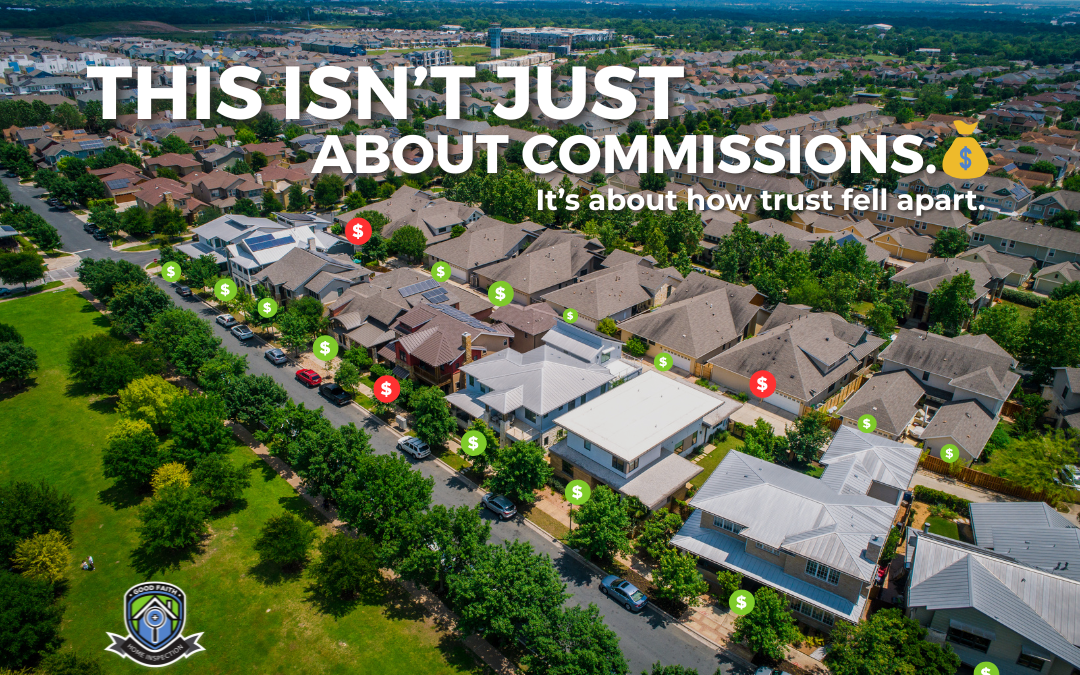Over the past few years, the American real estate industry has undergone one of the most significant reckonings in its history. What was once seen as a stable, reliable path to homeownership and financial growth has become riddled with distrust, lawsuits, and systemic flaws that are now impossible to ignore.
It didn’t start with the pandemic, but that’s when the cracks widened.
The Commission Crisis
For decades, home sellers were routinely told that a 6% real estate commission was the “standard.” What many didn’t realize—and weren’t told—is that this figure was fully negotiable. In some cases, commission rates reached as high as 8% to 10%, particularly in high-demand markets and during the post-2008 recovery years.
Behind the scenes, there were growing concerns of anti-competitive practices. Those concerns culminated in one of the most high-profile legal challenges in real estate history: Burnett v. National Association of Realtors, which resulted in a $1.78 billion jury verdict in 2023. The lawsuit alleged that NAR, along with several of the nation’s largest brokerages including Keller Williams and RE/MAX, colluded to maintain inflated commission rates by requiring home sellers to offer buyer agent commissions as a condition of listing on the MLS. RE/MAX and Keller Williams settled separately for a combined $242 million.
This was a turning point. It exposed how systemic the lack of commission transparency had become—and how many sellers had unknowingly overpaid.
The Pandemic Pressure Cooker
When COVID-19 hit, housing demand skyrocketed while supply dropped. Interest rates hit historic lows, creating a hyper-competitive market. Many Americans, stuck at home, started reassessing their living situations. Some invested in home improvements and cashed out at record-high home values—particularly homeowners who had purchased during the 2008 financial crisis.
In this frenzy, buyers were told that to win a house, they had to waive their protections: skip home inspections, bypass financing contingencies, and agree to “as-is” purchases. Many did so, thinking they had no other choice. This wasn’t just aggressive negotiation. It was institutional pressure wrapped in urgency and fear.
When Inspections Became Optional
Home inspections were never meant to be optional. They originated to protect consumers—especially buyers—from unknowingly purchasing homes with significant defects. Over time, inspections became a pillar of due diligence: a process of uncovering the truth before finalizing a sale.
But during the pandemic-era housing surge, inspections were framed by some agents as a liability. They were labeled deal-killers. Buyers were told: “If you want the house, you need to waive it.”
In 2021 alone, nearly 1 in 4 homebuyers waived their inspection contingency, according to a Zillow Consumer Housing Trends Report. That number climbed even higher in competitive markets.
Sellers Left in the Dark—And the Line
Sellers, meanwhile, were encouraged to do the opposite of transparency. Many were told not to get pre-listing inspections, or to limit disclosures, to avoid scaring buyers away. While technically legal in many states, this approach opened both sellers and their agents up to future liability.
Why? Because non-disclosure of known issues is the most common cause of post-sale lawsuits in real estate.
The Systemic Flaw: Timing
The biggest flaw in the real estate transaction isn’t bad actors—it’s bad timing.
Inspections usually occur after the buyer has made an emotional, financial, and psychological commitment to the home. At that point, the seller is ready to move out, the agent is waiting on their commission, and the buyer is one bad sentence away from buyer’s remorse.
If the inspection report comes back clean, the deal moves forward. But if it uncovers significant issues? Now the deal is hanging by a thread. The buyer has to decide whether to walk away, renegotiate, or take on a risk they didn’t sign up for. This puts everyone in a compromised position—and trust crumbles.
The Real Cost of Hidden Risk
These aren’t theoretical problems. They are real, documented, and deeply embedded in the way real estate is conducted in America today. From antitrust lawsuits to waived inspections, to sellers being coached on what not to say—this is a culture-wide pattern.
Buyers are blindsided. Sellers are misled. Agents who want to do the right thing are often outshined by those who bend ethics to meet quotas.
And yet, at its heart, real estate should be about one thing: helping people make safe, confident, life-changing decisions.
The Transparency Imperative
Transparency isn’t just a buzzword. It’s the medicine the industry desperately needs.
When buyers know the truth early, they make better decisions. When sellers are honest up front, they reduce liability. When agents operate with integrity, they don’t just win deals—they win loyalty.
Pre-listing inspections, open data access, and visible documentation are not threats to the deal. They are the foundation of a deal worth doing.
The truth is: real estate isn’t broken because of people. It’s broken because the system rewards silence and punishes clarity.
It doesn’t have to stay that way.
